Chabad on Campus International sponsors overseas summer trips for college learners.
In May of this year, I was part of a 150-student Chabad on Campus International delegation to Dubai. Including myself, the group included 53 students from Binghamton University in New York along with others from various college campuses around the country. These students had all taken 20 credits of JewishU classes during the school year.
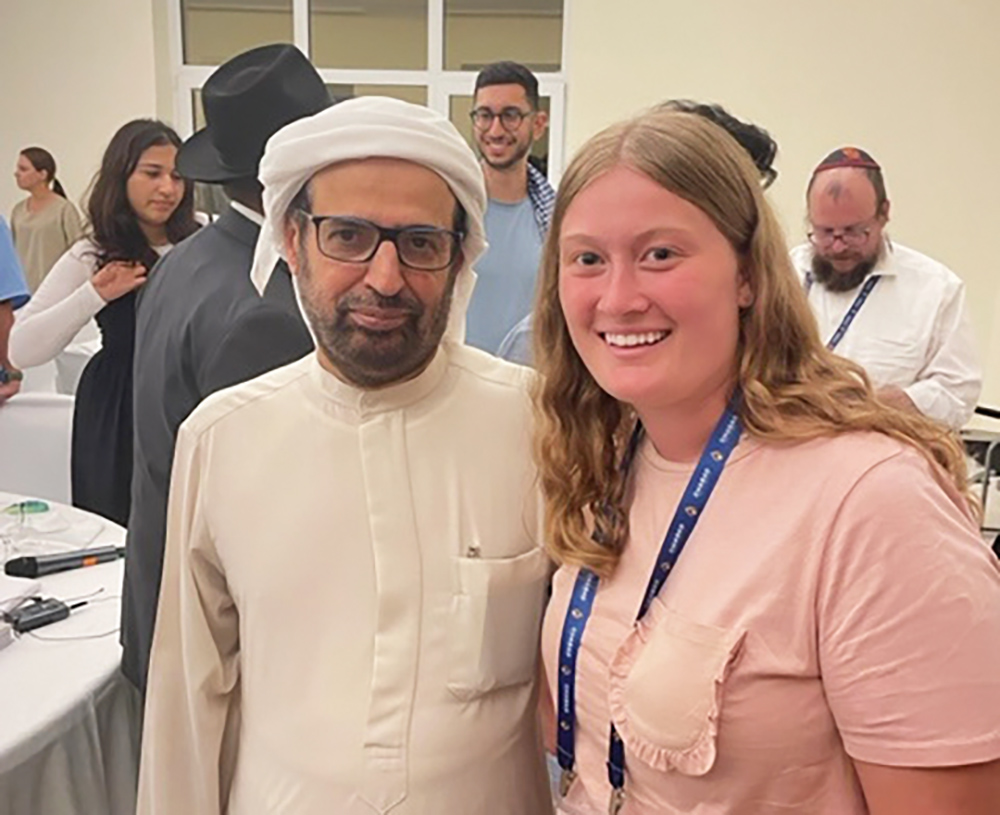
His Excellency
Dr. Ali Al Nuaimi.
JewishU is a curriculum-based Jewish learning program for campus Chabad houses, designed to cater to students of different backgrounds who are looking to increase their Torah knowledge and study. This year, our 20 credits earned us the opportunity to join Chabad on Campus for an all-expenses paid trip to either Dubai or Morocco this summer.
You might be wondering about these countries as choices for Chabad trips. So, why Dubai?
I chose Dubai based on knowing some of its recent political history, including its newfound relationship with Israel. I wondered if that was a factor in its being an option for this trip and why Morocco was selected as well, and reached out to Rabbi Shlomie Chein, vice president of student engagement at Chabad on Campus International, for an interview.
He shared, “The Talmud teaches that rewards ought to be ‘measure for measure.’ So for those who would go far out of their comfort zone to invest significant time in Torah study, Chabad on Campus would take them to an exotic location for an ‘out-of-the-ordinary’ experience. As a reward for Jewish learning, we also looked for ways these exciting trips could provide additional and unique Jewish education; for example, in Morocco there is a very long Jewish history, and Dubai is a role model of peace with Israel and a good example of being able to live as a proud Jew in a place you might not have expected it.”
The trip ended up being everything I could have hoped for, and more.
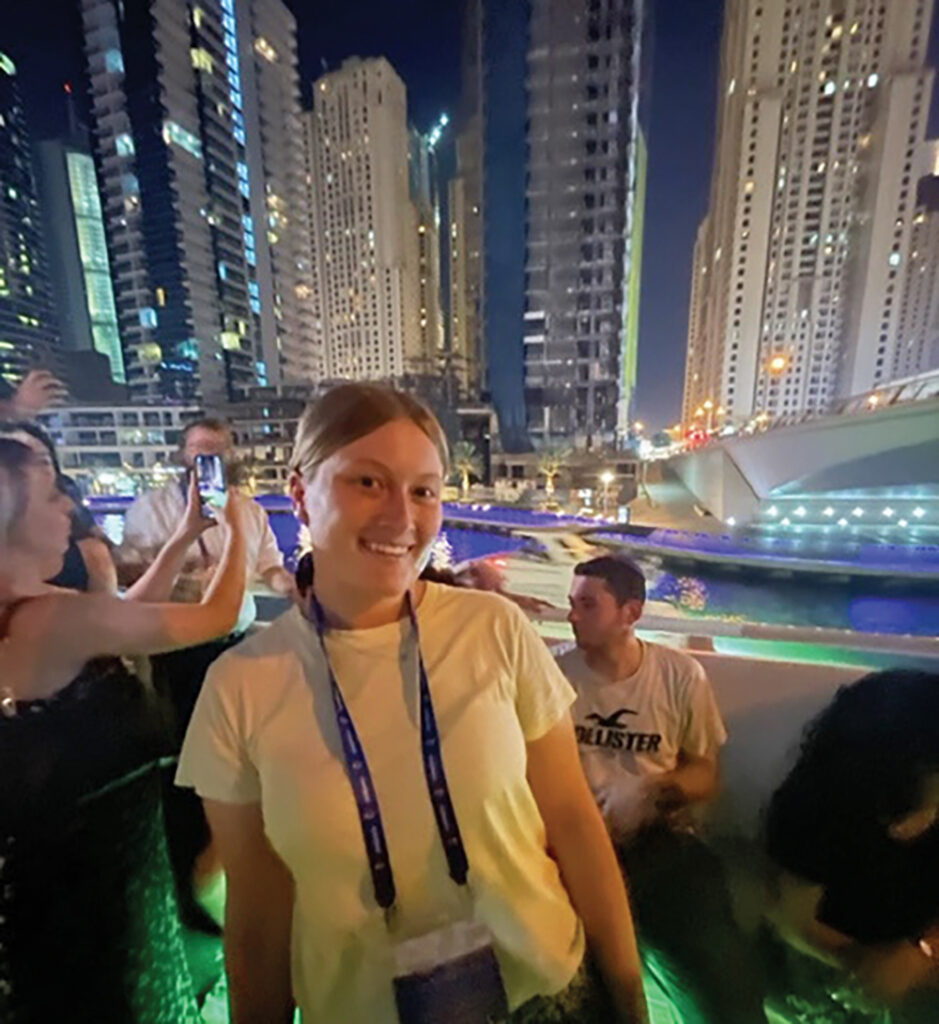
We arrived in Dubai in the evening and went straight to the beautiful Jumeirah Creekside Hotel, which houses its own kosher restaurant, where we were greeted with an elaborate dinner buffet. We got to mingle with the other students on the program, and met the many Chabad shluchim and shluchot who were staffing the trip.
The next day, as we would do every day, we started with a morning minyan and Torah learning before departing for our touring destinations. We began at the famous Burj Khalifa, a skyscraper in Dubai which, standing at 2,722 feet, is the world’s tallest building. On the 124th floor, overlooking most of Dubai, students took pictures, put on tefillin and got the first glimpse of what Dubai, the most populated of the UAE’s seven emirates, has to offer.
We next visited the Jewish preschool in Dubai and met with its Chabad rabbi. Hearing about the Jewish infrastructure that exists in an Arab country and recognizing the impact of the Abraham Accords was a unique experience. We discovered that there are between 5,000 and 7,000 Jews in Dubai, including more than 50 planes full of tourists that arrive from Israel weekly. The Jewish families that inhabit the UAE now have the resources necessary to live a life of Torah values in a region that was previously unwelcoming to them.
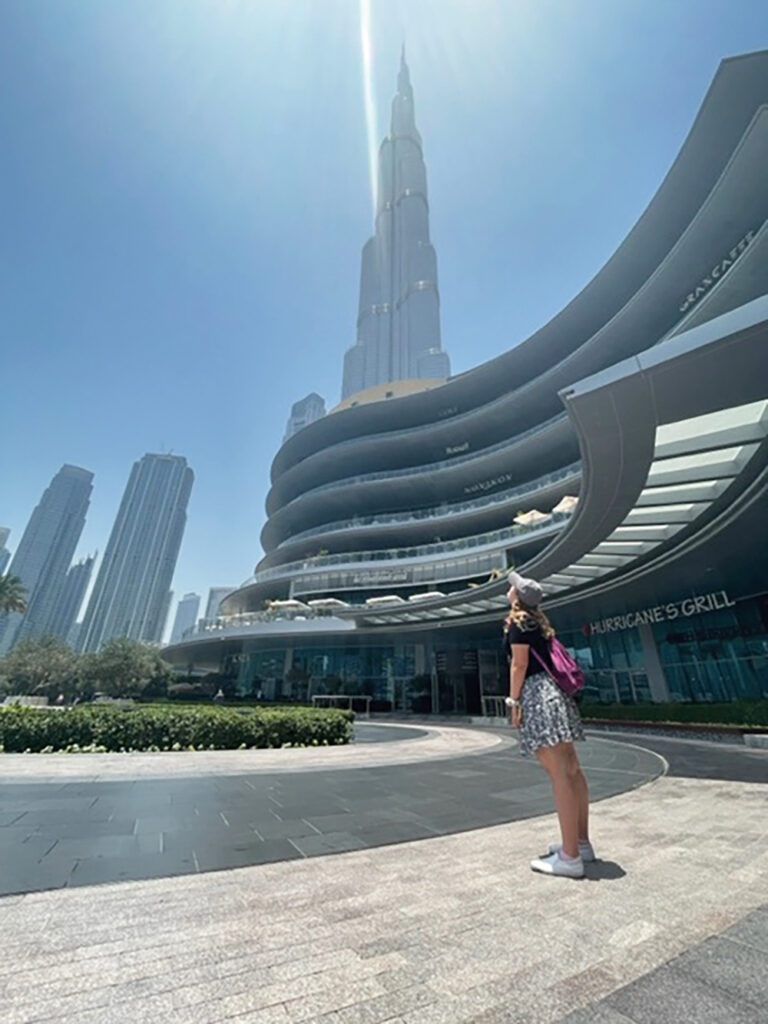
We ended that first day with ATV riding and jeeping in the Arabian desert, remaining in our jeeps to travel to our remote
dinner destination, which was somewhere deeper in the desert. On the way, we got lost three times, with each instance causing more aggravation for our drivers than the last.
You read that right. Lost. In the middle of the Arabian desert. Here’s the good news: Texting still worked and, as we later discovered, the drivers actually knew their way back to the hotel the entire time. Here’s the bad news: It didn’t matter because all we wanted at that moment was the dinner our stomachs were rumbling for after a long day of touring.
This is the text exchange between my mom and me:
Me: So we’re lost right now in the middle of the Arabian desert on our way to dinner, and the jeep drivers are all yelling at each other.
Mom: Did you forget that I’m your mother and you should probably wait to text me until you’re “un-lost?!”
Me: Point taken.
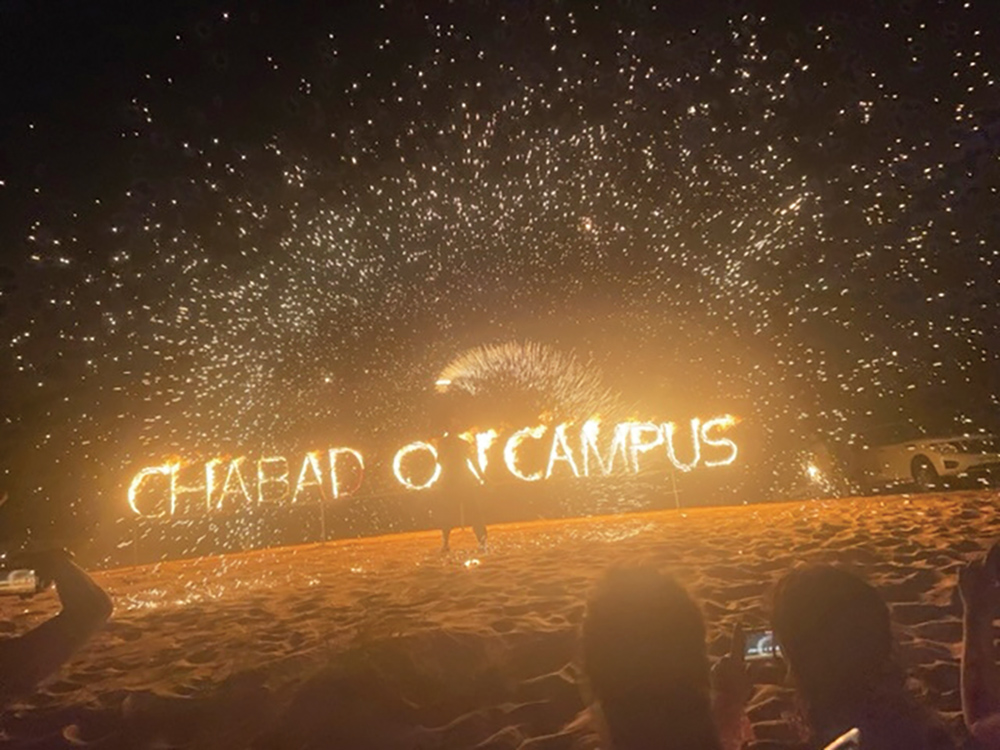
***
(20ish minutes later)
Mom: ummm …
Me: Oh, sorry. We’re good. They figured it out.
In case you were wondering, Waze isn’t quite the same in the middle of a desert; you have to use coordinates.
We traveled on extremely bumpy terrain in the darkness, hoping we’d locate our destination sometime before morning. After many cars got stuck in the sand multiple times, we finally arrived at our beautiful dinner buffet that was surrounded on all sides for miles by nothing but desert. Dinner was actually delicious, and the experience included camel riding, hennas and an exciting fire show. That first night properly bonded the group and was certainly an unforgettable chavaya (experience).
The next day, we went to a Holocaust exhibit at the Crossroads of Civilizations Museum. We also heard from one of the creators of the exhibit about the long process necessary to build it, and how it is internationally deemed a significant source of Holocaust information. The museum also includes exhibits exploring Muslim, Christian and Jewish history, among others.
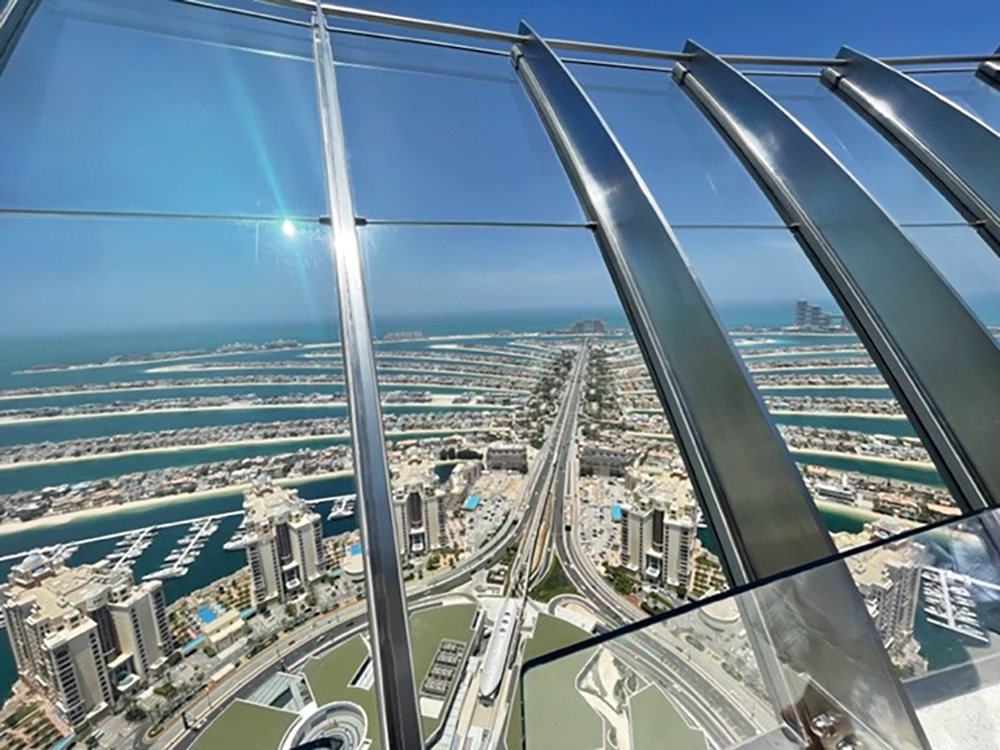
Then we traveled to the “Old City” of Dubai, the last area salvaged after 1971, when the UAE was established and the government rebuilt Dubai to its now-modern look. There, we had a Q&A with some residents of Dubai, where we were permitted to ask them any questions we had about the people, culture and way of life in the UAE.
We later took a boat ride to the shuk, where we perused the different spices, food and other items on display. This marketplace included the Gold Shuk, which is an individual row of the outdoor market that exclusively sells beautiful jewelry. We also went to the Museum of the Future that day, which was filled with futuristic predictions of scientific study.
One of the highlights of our trip occurred that night, when our delegation was invited to dine with His Excellency Dr. Ali Al Nuaimi from the ruling royal family of Ajman, the capital of the emirate of Ajman and the fifth largest city in the UAE after Dubai. He spoke to us about his connection to Jews and Israel and his hand in the Abraham Accords. There were also other government officials in attendance, including members of his staff, who addressed our group. We were permitted to shake his hand and take a photo with him, and enjoyed a delectable dinner spread prepared, of course, to our kashrut standards.
The next morning, we heard from Rashid Alabbar, one of the executives of Emaar, which is an Emirati real estate development company and one of the most famous businesses in all of Dubai. Alabbar has developed a close relationship with the Chabad rabbi in Dubai, who taught him Hebrew, and he was so inspired by Judaism that he built Dubai’s first mikvah.
After his presentation, we went to the Jumeirah Palm Islands, which is a man-made island built to appear as a palm tree. The world-famous Atlantis hotel is located at the end of the island.
From there we went to the Miracle Gardens, which is an extraordinary and huge display of flowers built into sculptures such as an airplane, hearts and castles. That may have been one of my favorite activities of the trip.
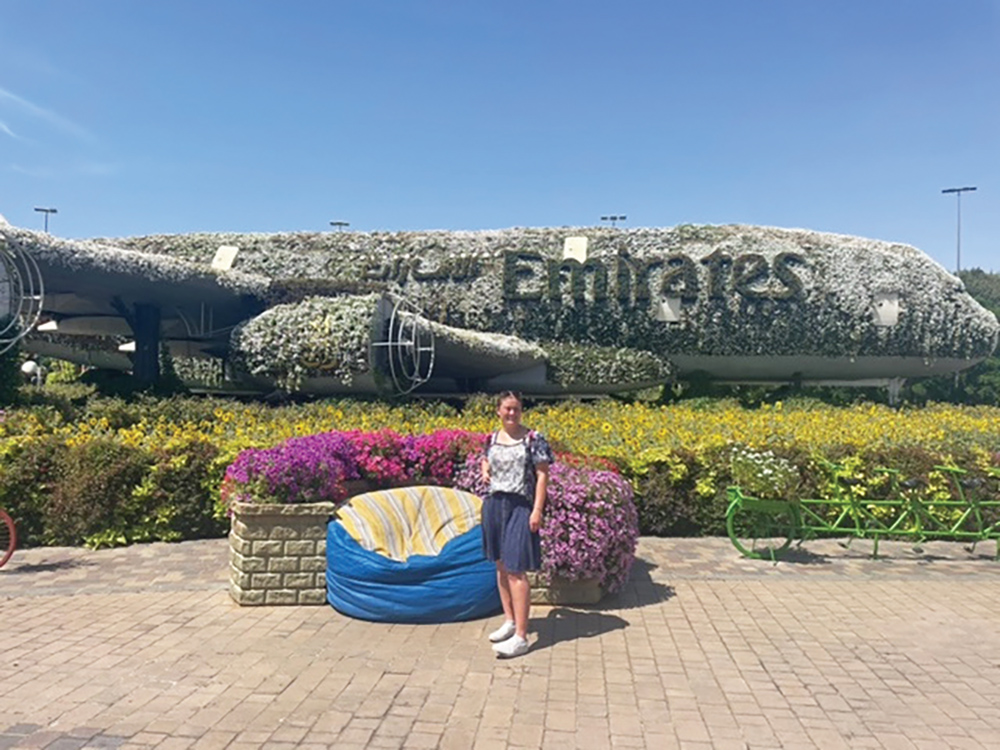
Our Friday night Shabbat meal was enjoyed all together, but afterward we broke into smaller groups. I went to an oneg, where we enjoyed singing, storytelling and dvar Torahs given by rabbis and students. After lunch the next day, we heard shiurim from talmidei chachamim who were brought in specifically to share words of Torah with us. Motzei Shabbat, we took a dinner cruise at the Dubai Mall Marina, which had beautiful views and — again — another amazing spread of food.
On our last day in the UAE, we went to the Multicultural Abrahamic House in Abu Dhabi, the capital of the UAE, where there is a church, mosque and synagogue on the same grounds. We were able to go up to the rooftop garden, where we had an inspiring view of all three houses of worship. We also davened Mincha in the shul, and even though we were unable to enter the church for halachic reasons, we were permitted to explore the mosque, provided we donned the traditional clothing which appropriately covered our bodies and the women’s hair, and removed our shoes.
We continued on to the presidential palace in Abu Dhabi, which is a majestic castle with beautiful gardens and multiple rooms through which to tour. The palace included multiple display cases of gifts that world leaders had brought when visiting the ruler of the UAE, an Emirati tradition that all government officials uphold. Some of the gifts were fascinating and very well represented the nations from which they came. Notably, there were a few gifts from Palestinian official visits but none from Israel, even though the exhibit had very clearly been updated since the signing of the Abraham Accords and there have been official Israeli visits to the UAE in that time. Nevertheless, we enjoyed exploring the intricacies of the palace’s marble walls and floors, the information in the various exhibits, and the splendor of the grand library.
We ended the trip with a banquet at the Ritz Carlton on the water in Abu Dhabi, with speeches and a video montage put together by the Chabad camera staff on-site.
Overall, this trip was a once in a lifetime experience, and I am grateful to Chabad on Campus International for the resources and effort put into the travels, and to the Chabad shluchim and shluchot at Binghamton for providing us with the opportunity. Exploring a new city, especially one with recent permission for entry, is a unique and special way of engaging in the world that Hashem gave us and connecting with a culture that is not our own.
Rabbi Chein shared, “Torah study is essential to Jewish identity, growth and continuity, which is why Chabad on Campus is determined to make that available to every Jewish student. We find that one of the challenges stopping Jewish students from studying their own heritage during their years of higher education is the difficulty in making time for additional study outside of the already heavy university study load. JewishU was designed to alleviate this challenge with bite- size courses, more flexible course schedules, and a multi-tiered reward system to top off the inherent reward of the knowledge itself.”
Hannah Kirsch is the summer intern coordinator and a rising senior at Binghamton University.








